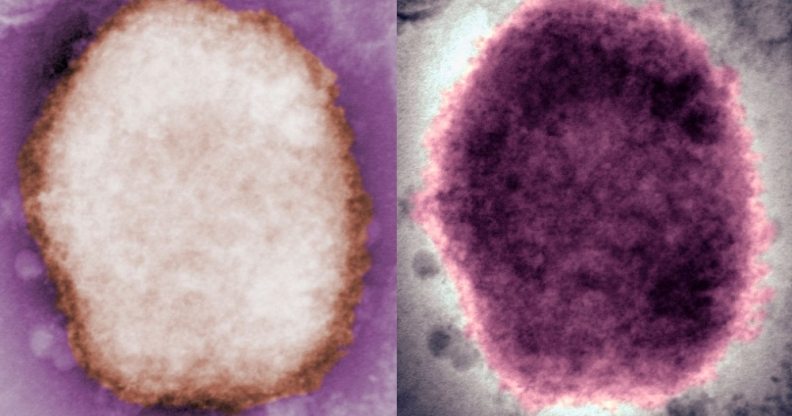UK monkeypox cases top 100 as government stockpiles vaccines

The monkeypox virus under a microscope. (Getty)
The UK Health Security Agency (UKHSA) has announced that the number of confirmed monkeypox cases in the UK has passed 100.
On Friday (27 May), the UKHSA said that a further 16 cases of the virus had been detected in England, bringing the total to 101 since 7 May.
On top of this, there are three confirmed cases in Scotland, one in Wales and one in Northern Ireland, bringing the UK’s total to 106, although “the risk to the UK population remains low”.
The UK has begun stockpiling vaccines against smallpox, which is caused by a virus very similar to monkeypox.
The UKHSA said that the government had purchased 20,000 doses of a safe smallpox vaccine called Imvanex, supplied by Bavarian Nordic, which is being offered to close contacts of anyone diagnosed with monkeypox in the UK.
According to the World Health Organisation (WHO), the smallpox vaccine has proved to be about 85 per cent effective in preventing monkeypox.
Health protection teams are currently contacting and assessing high-risk contacts, and in some cases asking them to isolate at home for up to 21 days, even if they remain well.
The UKHSA noted again that although monkeypox can be transmitted to anyone in the population, the “majority of the cases identified to date have been among men who are gay, bisexual and men who have sex with men“.
So far, new monkeypox cases outside of Central and West Africa, where the virus is endemic, have been detected in 21 countries, the majority of which are in Europe.
Early symptoms of monkeypox are flu-like, including fever, headaches, swellings, aching muscles, and exhaustion. Tell-tale rashes, lesions or spots may start to appear on the face, hands, and feet, before forming a scab which falls off.
Although not a sexually transmitted disease, monkeypox can be passed from person to person through close and prolonged human contact, as well as via clothing or linens used by an infected person.
Dr Susan Hopkins, the UKHSA’s chief medical adviser, said in a statement: “We are continuing to promptly identify further Monkeypox cases in England through our extensive surveillance and contact tracing networks, our vigilant NHS services, and thanks to people coming forward with symptoms.
“We are asking people to look out for new spots, ulcers or blisters on any part of their body.
“If anyone suspects they might have these, particularly if they have recently had a new sexual partner, they should limit their contact with others and contact NHS 111 or their local sexual health service as soon as possible, though please phone ahead before attending in person.”

